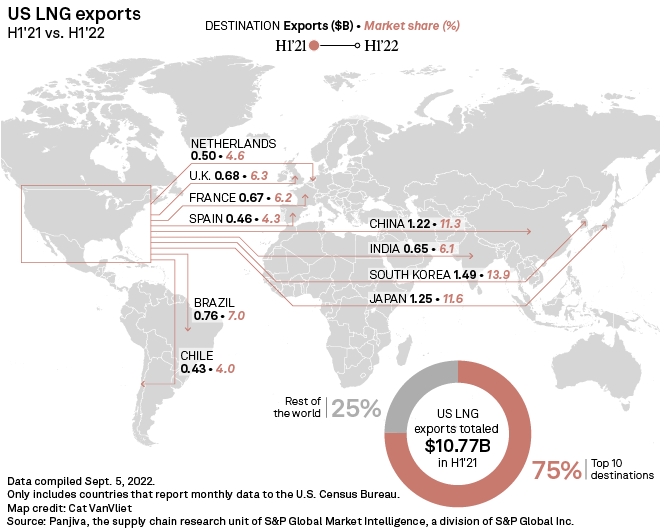Featured Topics
Featured Products
Events
S&P Global Offerings
Featured Topics
Featured Products
Events
S&P Global Offerings
Featured Topics
Featured Products
Events
S&P Global Offerings
Featured Topics
Featured Products
Events
Financial and Market intelligence
Fundamental & Alternative Datasets
Government & Defense
Professional Services
Banking & Capital Markets
Economy & Finance
Energy Transition & Sustainability
Technology & Innovation
Podcasts & Newsletters
Financial and Market intelligence
Fundamental & Alternative Datasets
Government & Defense
Professional Services
Banking & Capital Markets
Economy & Finance
Energy Transition & Sustainability
Technology & Innovation
Podcasts & Newsletters
13 Oct, 2022

|
Europe's ability to attract liquified natural gas cargoes is critical to managing through upcoming winters as Russian pipeline shipments remain suppressed, experts said. |
Europe will likely manage a drop in Russian natural gas supplies this winter as the war in Ukraine grinds on, but upcoming heating seasons will stress the continent's ability to meet energy demand, experts said during the Columbia Global Energy Summit in New York City.
Russian pipeline flows, which met about a third of the European Union's total gas demand in 2021, will likely fall by roughly 80 billion cubic meters in 2022, or about 20% of overall demand, according to Anne-Sophie Corbeau, global research scholar at Columbia University's Center on Global Energy Policy, or CGEP. Increased U.S. liquefied natural gas deliveries and Norwegian gas production will help offset the shortfall, but Europe will have to reduce gas demand by about 10% through efficiency and conservation initiatives, said Corbeau, former head of gas analysis at BP PLC.
"We can manage that during next winter if the winter is not too cold, if we continue to attract LNG," Corbeau said at the Oct. 12 event.

A mild 2021-2022 winter in Asia and China's zero-COVID policy, which suppressed economic activity and energy demand, have bolstered Europe's ability to divert LNG cargoes from the Asian market, Corbeau said. China is unlikely to lift its COVID-19 policy soon, as the government will aim to prevent virus transmission around major political events in October and in March 2023, according to CGEP Senior Research Scholar Erica Downs.
Meeting gas demand more challenging in 2023
However, Corbeau is concerned about the next two winter seasons due to the pace of LNG project startups, Europe's main source of incremental gas supply. Qatar's North Field East project and certain U.S. export terminals are not scheduled to come online until 2025, Corbeau said. Consequently, Europe may have to reduce demand more than currently anticipated, as it also faces sharp declines in nuclear and hydropower generation, Corbeau said.
Approaching the upcoming winter, Europe is on a path to offset Russian gas supply — which totaled 155 billion cubic meters in 2021 — through a combination of fuel switching, increased LNG imports, and efficiency and rationing, former Centrica PLC CEO Iain Conn said. Europe will likely follow the same model for winter 2023-2024, but the task will be "quite a bit harder" due to the need to replenish roughly 70 Bcm of gas storage, according to Conn, now a senior adviser to Blackstone Inc. and The Boston Consulting Group Inc.
"Why is this important?" Conn said. "If Europe can demonstrate that it can cope without Russian gas, there is no logic for natural gas prices being at $50 per MMBtu. And at that point, we will see the market settle back down. It may take well into next year to do so, and it may still not get back to historic levels."
Europe can manage without Russian gas starting two to three years from today, Equinor ASA Senior Vice President and Chief Economist Eirik Wærness said. But in the interim, cash-strapped Europeans will manage in part by rationing energy amid a cost-of-living crisis, Wærness said. Parts of European industrial hubs could also see "uncontrolled deindustrialization" as high gas prices force fertilizer, steel and aluminum facilities to shut down, paving the way to recession, the economist added.
Energy security fragile amid Russia's 'hybrid war' with West
Equinor has ramped up Norway's gas production by 10% in 2022, according to Wærness. While the current production level is probably sustainable for "quite a while," Norway does not have the capacity to raise output further, Wærness said.
Wærness also expressed concern about energy infrastructure security, following recent ruptures on the Nord Stream 1 and 2 pipelines from Russia, which have spurred allegations of sabotage. "Norway's a tiny country with a massively long coastline, and we have 9,000 km of pipelines" transporting oil and gas to the U.K. and Europe, Wærness said. "It's difficult to look over those 9,000 km of pipeline with a few Coast Guard vessels."
Many people in Europe and the U.S. do not fully understand that Moscow believes it is locked in a "hybrid war" with the collective West, according to Tatiana Mitrova, a CGEP research fellow who specializes in the Russian energy industry and market. Russia's goal in this war is to "create maximum damage for the West," and the Kremlin has shown that it is prepared to sacrifice its own gas industry to achieve that aim, Mitrova said.
"All these supplies which were being developed for decades, and all this trust and bilateral relationships with the customers, long-term contracts and so on — they are gone with the wind," Mitrova said. "And I think it will be impossible to restore this trust under any regime."
S&P Global Commodity Insights produces content for distribution on S&P Capital IQ Pro.